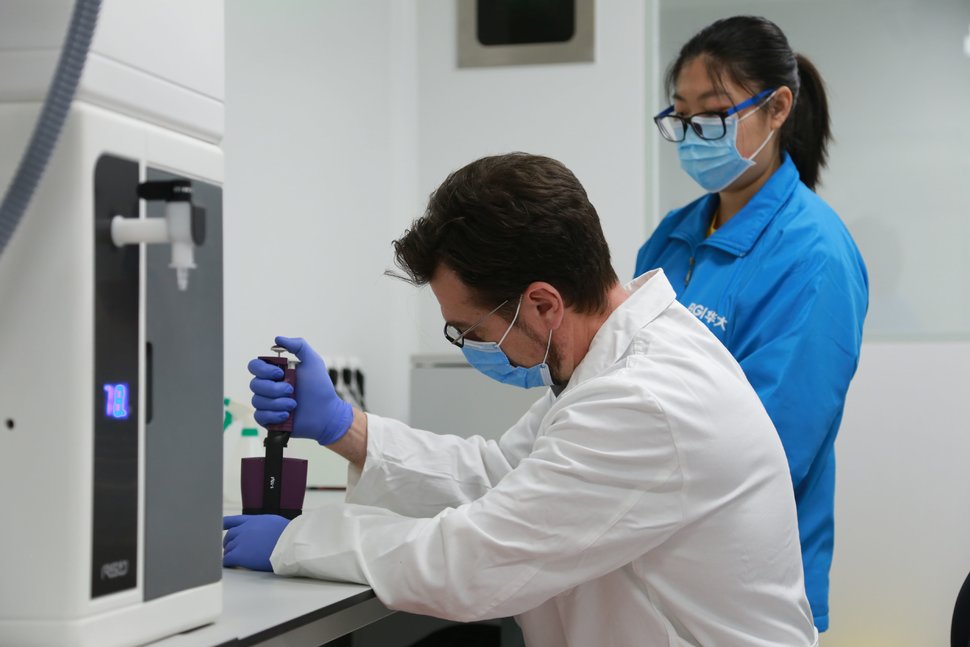A Chinese expert, right, from the biotech company BGI Group provides training to a Serbian expert at the Fire Eye laboratory in Belgrade, Serbia, on April 20, 2020.(Xinhua/Shi Zhongyu via Getty Images)
Since the coronavirus pandemic was declared, China, Europe, and the United States have provided assistance to many countries around the world as part of their “coronavirus diplomacy.” But some of these countries, such as Serbia, have been unfairly questioned over their willingness to request and receive support from a variety of partners.
In mid-March, the European Union abruptly put in place obstacles to the export of certain medical equipment to non-EU countries. As a formal candidate for EU accession, but not yet a full member, Serbia would now find it harder to work with its European neighbors to access supplies essential for saving the lives of its citizens.
At the same time, China began to offer Serbia these critical supplies and other forms of coronavirus assistance. China’s capacity to provide the aid was logical, since it was emerging from the crisis just as the spread of coronavirus was intensifying across Europe and the United States. As the rate of infection slowed in China, this freed up surplus equipment and medical expertise that could now be deployed elsewhere around the world. Indeed, Serbia welcomed this support.
Countries With the Best Health Care

In addition to vital supplies such as ventilators and personal protective equipment, China has also sent Serbia a team of medical experts from Wuhan with several months of on-the-ground experience battling the deadly virus. Because China was the global epicenter of coronavirus months before Europe and the United States, no other country, including Serbia’s European and American partners, has accumulated this experience and the consequent lessons about suppressing the disease. We are profoundly thankful to President Xi Jinping for his engagement.
But, despite these advantages, China is certainly not the only country to have helped Serbia in this time of crisis. While Brussels unfortunately maintained hurdles to the export of medical supplies to Serbia and our neighbors in the Western Balkans, the EU is now providing valuable support to Serbia and the region. Its aid stands at $41 million in immediate assistance for the Western Balkans to tackle the health emergency and the reallocation of $406 million to mitigate the economic fallout of coronavirus, including $85 million for Serbia alone.
In financial terms, the EU is the single largest donor to Serbia’s anti-coronavirus efforts since the pandemic was declared, but Brussels has been helping Serbia prepare for coronavirus even before the global spread of the COVID-19 disease. During the past 20 years, the EU provided more than $490 million in grants and loans to Serbia’s health system, which includes the delivery of over 250 emergency medical vehicles, half of which possess life-saving ventilators.
Similarly, the United States has provided more than $1 billion in overall assistance to Serbia in the past two decades and, even as they have become ground zero for the coronavirus pandemic, our American friends delivered 6,000 coronavirus tests to Serbia. We value this support, especially bearing in mind the immense coronavirus challenges that the United States itself is facing.
In the context of the crisis, Serbia has tried to return this gesture of support with its own gestures, such as transporting Americans in Serbia back to the U.S. at our own expense, which Secretary of State Mike Pompeo acknowledged in a letter of gratitude. Moreover, to show solidarity with the American people as they confront coronavirus, Serbia lit Belgrade’s most recognizable landmarks in the colors of the American flag.
We lit these same landmarks for Italy, Spain, France, China, and a number of other partners that have supported Serbia during the coronavirus pandemic or provided relevant assistance in the past. This is a deeply personal crisis for all of our societies. I have lost my closest childhood friend to coronavirus and my oldest son has contracted the illness.
What needs to be better understood and more readily accepted is that, when it comes to saving the lives of their citizens, Serbia and other countries that require external assistance to defeat coronavirus should not be expected to turn down, discriminate against, or temper their appreciation for legitimate forms of support based on its origins, regardless of whether it comes from the U.S., China, Europe or elsewhere. Such aid-shaming in the midst of an unprecedented global crisis is unjust. The leaders of these countries were elected to safeguard the health, security, and prosperity of their people, and this, rather than international politics, is our priority.
While Serbia is grateful to all the countries that have helped us manage the consequences of coronavirus, these acts of support and humanitarianism will not affect its overall trajectory. To the delight of some and disappointment of others, Serbia’s strategic objective was, is and will remain full membership in the EU and to become an even more dynamic stakeholder in the community of European nations.








